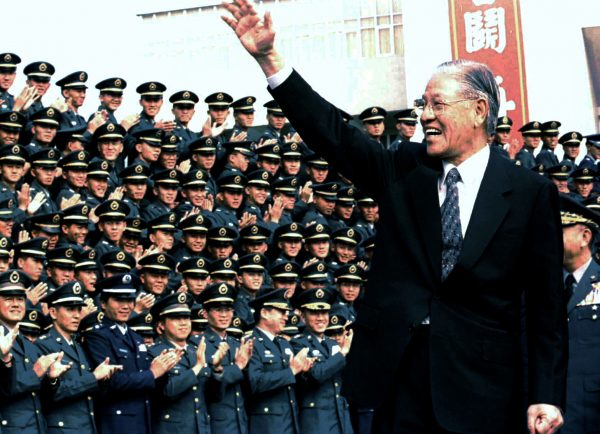Lee’s 1995 speech at Cornell University triggered the subsequent Third Taiwan Strait Crisis and the intervention of the US Navy’s 7th fleet air carrier battle group. Pressure from China only strengthened Lee’s resolve to carry out reforms at home. To publicise his ideas of democracy, Lee wrote for Foreign Affairs — the only Taiwanese president to have done so.
Still, the assessment of Lee and his achievements within Taiwan is debated. Many inside the Kuomintang (KMT) berate Lee for losing the political party’s long-term authoritarian rule of the country. They lament that Lee’s schemes led to the fragmentation of the KMT and brought irreversible damage to the party-state structure.
On the other hand, the opposition party, the Democratic Progressive Party (DPP), views Lee as a beacon of hope for the country. The miraculous transition from authoritarianism to democracy under his presidency is one of the most often-cited examples of successful regime transitions. The DPP blossomed under Lee’s rule and eventually became the incumbent party in 2000.
This political bickering misses an important question: how do citizens in Taiwan evaluate Lee’s leadership? Moreover, how does the public assess his leadership compared to other presidents? Granted that citizens, especially partisans, might be influenced by their party’s assessment of Lee, understanding how he is regarded in the public eye could help understand the reasons behind Taiwan’s democratisation.
A recent survey that compared Lee to other presidents of Taiwan after its democratisation provides an opportunity to do so. Between 5–7 November 2020, citizens of Taiwan aged 18 and above were polled. The phone-based survey asked 1076 participants the following question: ‘which president, after Taiwan’s democratisation, do you think has the best leadership? Lee Tung-hui, Chen Shui-bian, Ma Ying-jeou, or Tsai Ing-wen’.
Lee was the clear winner. Among all the respondents, 43 per cent chose Lee as the president with the best leadership, 32 per cent chose Tsai, 18 per cent chose Ma, and 6.6 per cent chose Chen.
Subsequent analyses revealed more nuances about the nature of party supporters’ views towards their chosen president. Lee was again the clear winner. All voters, including non-partisans, had at least a 40 per cent probability of choosing Lee as the president with the best leadership. Even among KMT supporters, the probability stood at around 40 per cent. The probability for non-partisans as well as independence-leaning New Power Party supporters was close to 60 per cent.
Other observations aligned with existing knowledge of Taiwanese politics. DPP supporters had the highest probability of selecting Tsai while KMT supporters preferred Ma. Perhaps due to his corruption scandals, Chen remained the most unpopular president.
What explains Lee’s high recognition among citizens in Taiwan? To start, Lee’s achievements could be unanimously applauded by everyone in Taiwan. But this explanation alone seems insufficient considering the strong opposition Lee received from his own political party (KMT). One potential explanation for Lee’s popularity within the KMT (almost identical to Ma) is the party’s localisation efforts. These efforts resulted in the inclusion of younger citizens whose views of Lee are more neutral or even favourable compared to their older compatriots.
As for Lee’s overall popularity among citizens, research shows that citizens often feel nostalgic about the ‘good old days’. This psychological mechanism may have led survey participants to focus on the positive aspects of Lee’s presidency, such as rapid economic development, and downplay negative perspectives, yielding higher approval for Lee than if the poll had been conducted earlier.
Some may wonder why Tsai is not more popular, considering Taiwan’s success in curtailing the spread of COVID-19 prior to May 2021. First, Tsai did not benefit from the nostalgia effect that Lee might have enjoyed. Second, the opposition party was unsatisfied with Tsai’s performance during the pandemic, lowering her overall approval rating. Third, political parties and campaign studies show that citizens tend to view female and male presidents differently, so gender could have affected Tsai’s approval too.
Lee’s contributions to Taiwan’s democratisation are probably best exemplified by his support among non-partisans. Non-partisans had close to a 60 per cent probability of choosing Lee as the president with the best leadership. In second place was Tsai with only 20 per cent, suggesting that what Lee had done was transformational and lauded by citizens across all parties. The evidence is clear: Lee is regarded as a bona fide great president with superior leadership qualities among Taiwanese citizens.
Fan-Yu Chen is Assistant Professor of Political Science at Soochow University, Taiwan.
Austin Horng-En Wang is Assistant Professor of Political Science at the University of Nevada, Las Vegas.
Charles K S Wu is Assistant Professor of Political Science at the University of South Alabama.
Yao-Yuan Yeh is Chair and Associate Professor in the Department of International Studies & Modern Languages at the University of St Thomas, Houston.

